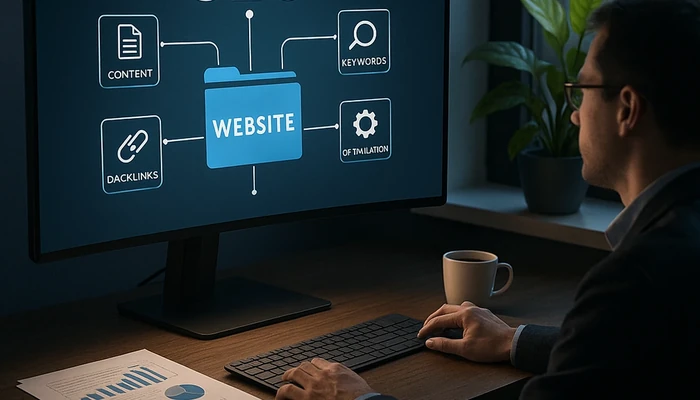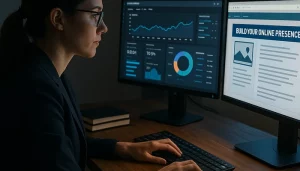SEO Tactics for Lead Generation: The Ultimate Guide for Results-Driven Businesses
Every business owner and marketer faces the same challenge: How do you attract high-quality leads that actually convert into customers, not just clicks? If your website isn’t generating steady inquiries and your marketing campaigns aren’t bringing measurable results, you’re not alone. In today’s highly competitive digital landscape, especially in the United States, effective SEO tactics for lead generation are the engine that drives sustainable business growth.
This guide breaks down the proven strategies, critical metrics, frameworks, and common mistakes associated with SEO-driven lead generation. Armed with transparent advice and actionable steps, you’ll learn how to integrate SEO with conversion-focused web design, local SEO, mobile apps, and analytics—while avoiding the traps that undermine ROI. The experts at Boxmark Digital bring their years of experience helping companies across the United States to deliver a clear path from search to sales, no guesswork required.
Strategic Context: Why SEO Tactics for Lead Generation Matter
Why This Topic Matters for the Business
Lead generation is the lifeblood of business growth. Organic SEO strategies tailored for lead generation can help you:
- Attract prospects who are actively searching for your solutions, not just traffic for the sake of numbers.
- Reduce reliance on costly paid advertising by building a long-term acquisition channel.
- Support sales teams with a predictable pipeline—fueling growth year-round.
Typical Problems This Solves
- Website visitors not turning into actual leads or customers.
- Vanishing ROI from campaigns due to low-quality inbound inquiries.
- Local businesses being invisible in relevant online searches.
- Poor integration between website design, SEO, and marketing funnels.
Understanding and applying the right SEO tactics for lead generation empowers businesses to overcome these challenges, build trust with their audience, and generate sustainable results.
To further explore how strategic SEO drives business value, visit our guide on the power of SEO marketing in competitive environments.
Key Concepts You Must Understand
Basic Definitions
- Lead Generation via SEO: The process of attracting potential clients to your website through organic search and converting them into actionable leads.
- Local SEO: Optimizing your digital presence to appear in geo-targeted searches by potential clients in your locality.
- Conversion-Focused Web Design: Creating web pages that guide visitors smoothly from discovery to inquiry—reducing friction and boosting conversions.
- Marketing Funnels: Structured digital journeys, often starting with informative content and ending with a strong call to action for lead capture.
- Analytics: Measurement tools (like Google Analytics and Search Console) used to track site performance, user behavior, campaign ROI and more.
Differences vs Other Approaches/Channels
- Paid Ads: Provide quick visibility but disappear when budgets stop—SEO builds lifetime value.
- Traditional Marketing: Often not as targeted as SEO, which captures intent-based searchers.
- Referral or Word-of-Mouth: Important but less predictable than a search-based lead engine.
- Standalone Apps or Brochure Sites: May miss search visibility and conversion optimization benefits.
Comparing SEO Tactics for Lead Generation
| SEO Tactic | Lead Quality | Time to Results | Best Use Cases |
|---|---|---|---|
| Local SEO | High, geo-targeted | 4–12 weeks | Service businesses, SMBs |
| Conversion-Focused Web Design | Very high | Immediate to 8 weeks | All businesses upgrading their website |
| Marketing Funnels | Medium to high | 4–10 weeks | B2B and education/consulting |
| SEO-Powered Apps (Landing Pages) | Medium to high | 8–16 weeks | Product launches, campaigns |
Common Mistakes and Bad Practices
Mistake 1: Ignoring User Intent and Search Context
Packing your website with keywords isn’t enough. Many businesses forget to align on-page content with what users actually want to accomplish. This leads to high bounce rates and low conversions.
Mistake 2: Poor Integration of Web Design and SEO
SEO and web design must work together. Slow websites, unclear navigation, or mobile-unfriendly layouts quickly destroy the effectiveness of your SEO tactics for lead generation. Always ensure fast load times, clear calls to action, and mobile-responsiveness.
Mistake 3: Not Tracking the Right Metrics
Businesses often obsess over rankings or vanity metrics (like total visitors), but what matters is leads and conversions. Failing to connect website goals to specific, trackable metrics means you can’t prove ROI—or improve performance. Learn more about tracking SEO ROI effectively.
- Focusing only on national keywords and ignoring local, highly-converting search terms.
- Using outdated SEO tactics that don’t reflect how Google’s algorithms evaluate user experience today.
- Neglecting regular SEO audits and on-page optimizations. Discover the benefits of a comprehensive SEO audit.
Best Practices and Recommended Framework
Step 1: Start with Strategic SEO Audits
Begin every initiative by diagnosing opportunities and issues using a holistic SEO audit: review technical health, on-page SEO, local signals, and content gaps. This foundation ensures your tactics are aligned and measurable.
Step 2: Optimize for Local and Mobile Search
- Set up and optimize your Google Business Profile.
- Use schema markup to highlight services and local info.
- Refine site navigation and page speed for mobile users. Transitioning to mobile-first SEO.
- Target geo-intent keywords and ensure location accuracy across directories.
Step 3: Align Marketing Funnels with Content and Analytics
Design your website and content around the journey from first visit to inquiry. Use clear lead magnets: downloadable guides, calculators, or contact forms with zero friction. Connect these funnel steps to analytics to monitor drop-off points and optimize conversion rates.
- Regularly A/B test key landing pages and calls to action.
- Leverage conversion-focused design elements—contrasting buttons, simple forms (max 3–5 fields), and trust signals (reviews, certifications).
- Segment campaigns by channel: organic, paid, referral, and optimize spend accordingly.
For the latest trends in web design that impact lead generation, refer to this comprehensive guide on modern web design trends.
Metrics and Measurement
Key KPIs
- Qualified Leads: Number of completed forms, calls, or demo/bookings that align with your target client profile.
- Conversion Rate: Visitors who become leads, expressed as a percentage.
- Organic Visibility: Rankings and impressions for your core keywords.
- Cost per Lead (CPL): Total investment divided by number of valid leads.
- Engagement Metrics: Bounce rate, time on page, and pages/session.
How to Interpret Results
- Correlate spikes in leads to specific SEO initiatives: Was it a blog series, new landing page, or technical fix?
- Look beyond rankings to focus on conversions and revenue impact.
- Segment results by channel—see if organic search outperforms paid ads on lead quality.
Data-Driven Decisions
Review data on a monthly basis and compare against historical trends. Use dynamic dashboards to showcase metrics visually. Adjust campaigns using actual performance data, not assumptions. For step-by-step analytics improvements, see our in-depth analytics and SEO framework.
For further inspiration, see top examples of effective ecommerce website design that convert, as documented in Shopify’s official resources on ecommerce website design.
Frequently Asked Questions (FAQ) about SEO Tactics for Lead Generation
How long does it take for SEO tactics to generate leads?
Most SEO campaigns begin showing lead results in 4–12 weeks, but this depends heavily on competition, website history, and resource investment. Some quick wins may emerge sooner with technical fixes and local SEO optimizations.
Should I invest in local SEO if I only serve my city or region?
Absolutely. Local SEO ensures your business appears in “near me” and geo-targeted searches, driving high-intent leads to your site. Discover practical advice for local SEO here.
What are the biggest SEO mistakes that hurt lead generation?
Ineffective keyword targeting, slow-loading websites, missing localized content, and poor measurement habits are the most common. Learn how to avoid these in our common SEO mistakes checklist.
How do conversion-focused web design and SEO work together?
A conversion-focused website uses intuitive layouts, fast load speeds, and clear CTAs. When paired with search-optimized content, this synergy maximizes both search visibility and inquiry rates.
Where should I start if my website isn’t generating any leads?
Begin by conducting a complete SEO and website audit—identify technical issues, assess content quality, and review analytics for user behavior trends. Our team can help you request a personalized website audit.
What role do mobile apps play in lead generation strategy?
Mobile apps can extend your brand presence and improve user engagement, especially for industries where ongoing interactions drive loyalty. Integrate app experience with your broader digital funnel. To see what this process typically involves, see our mobile app development insights.
Is paid advertising necessary alongside SEO?
Paid ads can complement SEO, especially for time-sensitive campaigns or when organic visibility is still growing. The most impactful strategies balance short-term paid growth with long-term SEO investments.
How do I know if my SEO investment is paying off?
Measure form submissions, calls, and qualified inquiries monthly. Compare lead quality, conversion rate, and ROI over time. Granular analytics help you make smart decisions—track more than just rankings, as detailed in our ROI framework.
What is the #1 thing I should do differently to improve lead generation from SEO?
Think beyond keywords. Ruthlessly optimize your entire journey from search to form submission: fast load speed, 1-click access to CTAs, relevant local content, and regular measurement for continual improvement.
Wrap-Up and Next Steps
Implementing the right SEO tactics for lead generation can fundamentally transform your business—driving predictable pipelines of high-quality leads, not just page views. Remember: success depends on blending search optimization, conversion-focused design, local targeting, and data-driven iteration. There is no one-size-fits-all tactic; adjust based on your goals, market, and existing assets for the greatest impact.
Ready to move from uncertain results to reliable lead generation? Talk to the Boxmark Digital team or improve your SEO strategy for sustainable growth. For a custom analysis of your digital sales funnel, explore your web design opportunities with experts who focus on conversion. Results are achievable—provided your strategy is both measured and continually optimized.
About Boxmark Digital
Boxmark Digital is a digital marketing agency supporting businesses across the United States and beyond. With deep expertise in SEO, conversion-focused web design, custom mobile app development, and data-driven digital marketing, our team delivers measurable, strategic growth for local businesses, SMBs, and enterprise clients. Our experience spans various industries and campaign types. We’re driven by transparent reporting, continual optimization, and results that positively impact your bottom line.

digital marketing companies around chicago, organic seo services chicago, local seo services for chicago, local seo service Indianapolis, local seo services Dallas, Jacksonville local seo services, best seo company in San Antonio, local seo services for Phoenix, Las Vegas seo experts, Austin seo marketing company



